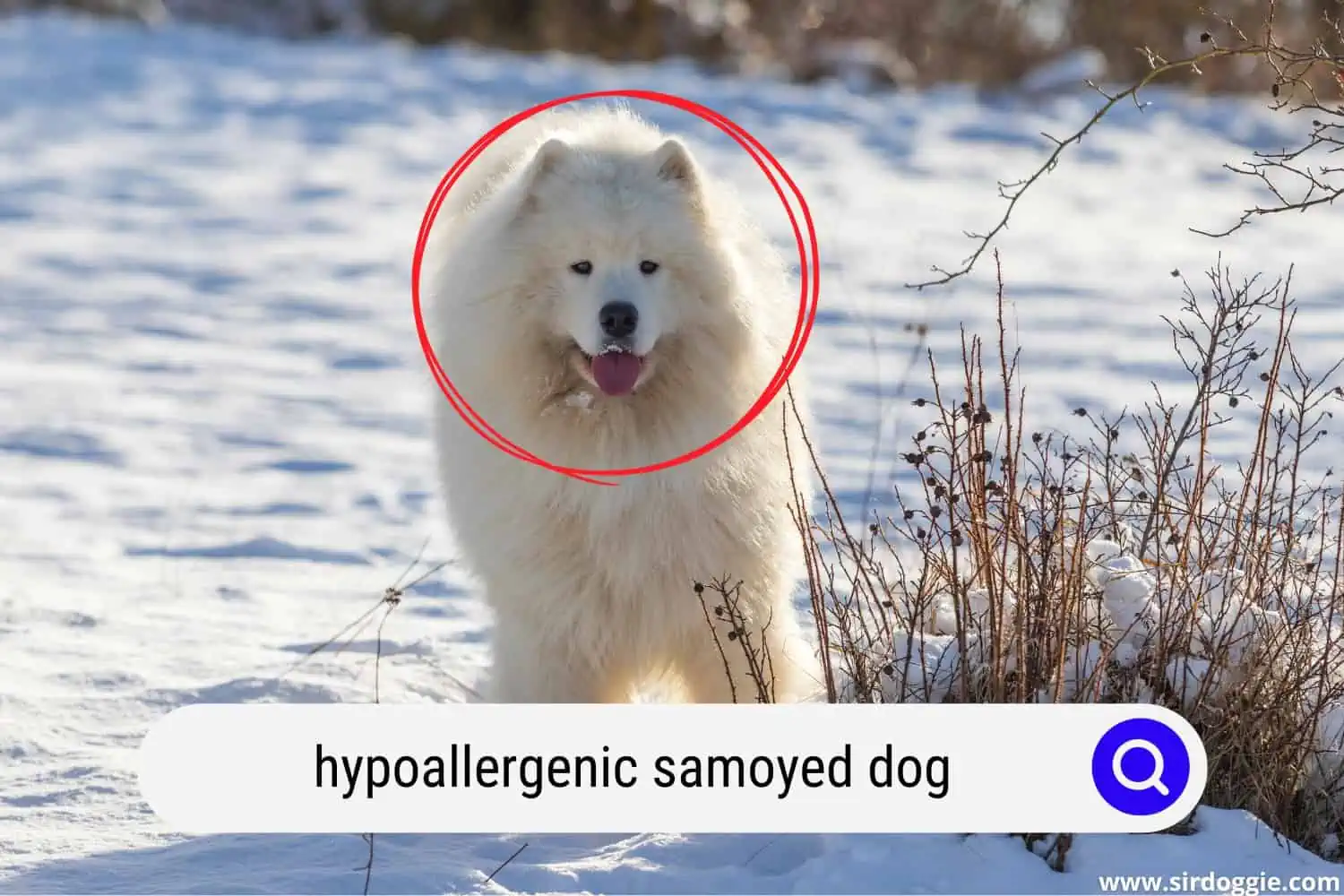Are Samoyeds Hypoallergenic?
Are Samoyeds hypoallergenic? Well, they are considered to be a hypoallergenic dog breed by most experts.
Samoyeds or simply, “the smiling sled dogs” are medium-sized, friendly pups with a herding instinct. These glamorous white dogs have dense double-layer coats full of fluffy white hair.
Typically, dogs that shed less are more hypoallergenic, but in the case of Samoyeds, this is not true. Samoyeds have low dander levels and hardly drool, but shed a lot!

Samoyeds “blow” or shed the undercoat twice a year. This will usually occur in spring and autumn, at the changing of the seasons/drastic temperature fluctuations. That’s the reason that experts tend to argue about their classification as a hypoallergenic breed.
They are considered to be a good option for people who suffer from allergies as they are less likely to cause an allergic reaction due to their low dander levels.
Some of the links in this post are affiliate, and we may earn a commission.
Related Reading: Why Are Samoyeds Called Shoobs?
Are Samoyeds a High-Maintenance Dog?
Samoyeds are considered high-maintenance dogs because of their thick, fluffy coats. The Samoyed has a double-layer coat, with a very thick undercoat and overcoat of long guard hairs. Their coats were designed to keep the Samoyed warm in harsh Siberian winters.
They shed quite a bit and require a lot of grooming. Samoyed’s elegant white coat is beautiful but requires rigorous grooming to keep it in good condition. The white fluffy coat of the Samoyed is not easy to groom, especially for first-time dog owners. Many Samoyed owners even opt to hire a professional groomer for their pets.
Samoyed’s Grooming Needs
Let’s have a look at Samoyed’s grooming needs:
- Daily brushing is necessary for Samoyeds during the period when the coat is shedding. Brushing frequently saves you from loose hair flying around your house. Apart from the shedding season, they still need to be brushed once or twice a week to remove debris or mats and prevent tangles.
- Bathing a Samoyed is a time-consuming task. It requires thoroughly soaking the dense coat, rinsing out the shampoo, conditioning, and letting it dry completely. Give a bath about once every eight weeks or when the dog gets dirty. Use a moisturizing shampoo and conditioner to soften the fur. Bathing also helps to get the shedding period over with more quickly.
- Brush your Samoyed’s teeth at least two or three times a week to remove tartar buildup. Regular tooth brushing with a soft toothbrush and doggy toothpaste will keep their gums and teeth healthy.
- Trim your Samoyed’s nails once or twice a month if your pooch doesn’t wear them down naturally walking on rough surfaces. This will have the bonus of keeping your legs from getting scratched when your dog enthusiastically jumps up to say hello!
- Your Samoyed’s ears should be checked weekly for dirt, redness, or a bad odor. If required, clean inside the ear with a cotton ball and a pH-balanced gentle cleanser.
- Your Samoyed’s eyes should be clear with no redness or discharge. Make sure to clean any discharge daily so that it does not stain the fur around the eyes.
- When you groom your Samoyed, look inside its mouth. Check for sores or signs of infection such as redness, tenderness, or inflammation on the skin.
Make grooming as pleasant as possible for both you and your Samoyed, starting during puppyhood.
Samoyed’s Grooming Tools
Arm yourself with the right grooming tools that will help you keep your dog looking great. When it comes to finding grooming tools that can be used for grooming your Samoyeds, here is a list that can help:
- Pin Brush
- Slicker Brush
- Grooming Rake
- Dog Nail clippers
- Canine Shampoo and Conditioner
- Dog Toothbrush and Toothpaste
- Ear Cleaning Solution and Cotton Balls
| # | Preview | Product | Price | |
|---|---|---|---|---|
| 1 |

|
Swihauk Self Cleaning Slicker Brush for Dogs & Cats, Skin... | $12.98 $8.99 | Check Price on Amazon |
| 2 |

|
Wahl Premium Pet Double Sided Pin Bristle Brush with... | $11.99 $9.99 | Check Price on Amazon |
| 3 |

|
Pecute Self-Cleaning Slicker Brush for Dogs, Cats,... | $11.99 $8.49 | Check Price on Amazon |
What Does “Hypoallergenic Dog” Mean?
A hypoallergenic dog means you are unlikely to have an allergic reaction, not that you are guaranteed total safety from allergies. A hypoallergenic dog has very few or no allergy-producing substances known as allergens.
If a person has pet allergies, they might be looking for hypoallergenic breeds. Remember that no dog breed is 100% hypoallergenic. Some hypoallergenic breeds could still trigger an allergic reaction in people with strong allergies to them.
Hypoallergenic dogs are generally low shedders. However, the typical trigger for a dog allergy is not fur or dog hair. It is dander or flakes of dead skin.
Dogs secrete proteins that end up in their dander, saliva, and urine. The most common allergies are caused by the Can f 1 and Can f 2 proteins from dogs.
The dog fur usually acts as a carrier for dander. In breeds that tend to be low shedders, the allergy-causing dander is released in very small amounts. When dog hair sheds, dander is easily spread through the home and sticks to furniture, bedding, fabrics, and many other items; frequently causing an allergic reaction (even when the dog is not present in the room).
How Do You Stop Dog Allergies?
Allergic reactions from dogs can range from mild sneezing to much more severe symptoms.
Some symptoms of dog allergies are:
- Coughing and wheezing
- Runny, itchy, and stuffy nose
- Itchy skin
- Red, itchy, or watery eyes
- Sneezing
- Hives
- Puffiness around the face
- Tightness in the chest and shortness of breath
Dander can stick to household items, such as curtains, furniture, bedding, and carpets. If you are allergic to dogs, but still want to keep one, don’t worry! Consider the following steps that you can take to manage your allergy symptoms.
Regular brushing
Maintain a regular brushing routine for your dog. You must ensure you brush outdoors to avoid excess hair in your home.
Regular bathing
The cleaner your Samoyed is, the less likely it is that they will shed dander from their coats. Give your dog regular baths to remove dander from its coat. Regular bathing, long-term, can minimize dander levels on your dog.
Keep your bedroom pet-free
Keep your Samoyed outside your bedroom, especially off your bed. Restrict it to only a few rooms of the house.
Regular vacuuming
Invest in an efficient vacuum. Vacuum regularly and keep your floor and carpets clean.
Consider an air purifier
Get an efficient air purifier (open the Amazon tab) and maintain good ventilation to help reduce airborne dog allergens. Use a HEPA air filter to clean the air that you breathe every day.
Keep your house clean
Use a pet roller to get as much of your dog’s fur off the couches and chairs as possible, between vacuums. Dust and clean your home thoroughly and also your Samoyed’s toys and bedding. Wash your dog’s rugs, beds, cushions, blankets, washable play items, and toys regularly to avoid dander build-up.
Take precautions or avoid direct contact with the dog
Avoid touching eyes or face after contact with dogs. Wash your hands with soap after contact with dogs. Avoid close contact such as hugging or kissing your dogs.
Consider allergy shots
Allergy shots or allergy vaccines will help you develop antibodies so that you won’t have severe allergic reactions when exposed to some allergens.
You can manage allergy symptoms by making lifestyle adjustments, which will allow you to live happily with your dog. If you experience severe or chronic dog allergies, you should speak with a doctor about medications and treatments that can help manage allergy symptoms.

Final Thoughts
Many dog lovers around the world are allergic to their dogs. However, this has not stopped them from finding a way to live with these wonderful furry companions.
If you like fluffy dogs and are allergic to most types of dogs, there is a good chance that Samoyed will work for you. Although Samoyeds are not usually the best breed for allergy sufferers (as they do shed), they are still considered to be hypoallergenic dogs.
Expect to put in plenty of work, and your allergies and your Samoyed will hopefully get along just fine.
Did you find this article useful? Feel free to share your thoughts. We would be happy to hear from you!

Family Dog Expert Author
Hi there! I’m Stuart, a devoted dog lover and family dog expert with over a decade of experience working with our furry companions. My passion for dogs drives me to share my knowledge and expertise, helping families build strong, loving bonds with their four-legged friends. When I’m not writing for SirDoggie, you’ll find me hiking, playing with my beautiful dog, or studying music.